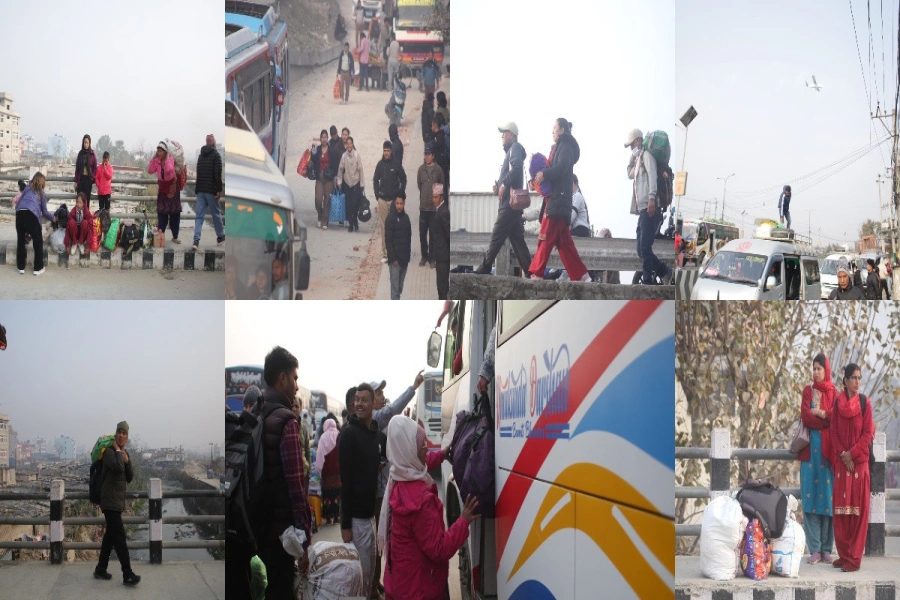KATHMANDU, Oct 23: As the sexual and gender minorities eagerly await the 2021 National Census to further their identities, a dilemma exists among government officials whether the census is the right methodology to reflect their population status.
The dilemma is rooted in the 2011 national census, when Nepal, for the first time began counting the third gender population, breaking the notion of gender binary. Nepal is at the forefront of countries that have included third gender in their national censuses.
India is the first country in the world to allow a third “other’ category for individuals who do not wish to be identified as either male or female.
“We had included an additional category “others”, besides male and female, in the last census. However, their number was limited to only around 1,500,” says an official at the Central Bureau of Statistics (CBS), adding that the CBS did not publish the number assuming that their numbers could have been under-reported. The number was in a sharp contrast to the claim of non-governmental organizations working for the sexual and gender minorities that estimate their number to be above 800,000.
“The sexual and gender minorities cannot reveal their identities as their family members do not allow it to happen, so our population is under reported,” argues Bhumika Shrestha, program manager at Blue Diamond Society, which has been working to promote the rights of these communities since 2001.
National Census 2021: Gender ratio is 95 men per 100 women

The biological identity is the major basis of sexual identity in the Nepali society therefore the third-gender people find it extremely difficult to publicly declare their “otherness”, argued Shrestha.
But Nepal’s constitution clearly mentions the rights of the sexual and gender minorities in articles 12, 18 and 42 and calls for the specific protective measures for them with positive discrimination. Also, Nepal issues citizenship and passport to third gender people clearly mentioning their sex as “other”. Sunil Babu Pant, a third-gender activist, was nominated to the constitution assembly in 2008 under the proportional representation system.
As everywhere, LGBTI in Nepal stands for lesbian, gay, bisexual, transgender and intersex people. A sixth category, queer is also added recently to this community.
“Though the laws have guaranteed our rights, our voices remain unheard on many fronts, argued Dilu Baduja (previously Badri Pun), of the Inclusive Forum, an NGO working for sexual and gender minorities.
On Monday, four organizations -- Blue Diamond Society, Mitini Nepal, Inclusive Forum and Campaign for Change -- which are working for the welfare of the sexual and gender minorities met with CBS officials and requested them to collect authentic data on the third gender people during the 2021 national census. CBS, on Sunday, announced that the 12th national census would be held in June 2021.
Director of the population section at CBS, Dhundi Raj Lamichhane argued that the method used in the national census has been “ineffective” for collecting data on LGBTI communities. He suggested that a separate national survey could be a right method to reflect their status.
The bitter experience of 2011 census tells us that a single question is not sufficient to collect authentic data on the third gender population, he argues, adding that a set of detailed questions needs to be formulated to ascertain whether someone is a third gender or not. He added that the survey should be done on an individual basis, and in peaceful environment to gather authentic information.
The first round of discussion with the CBS was very positive, said Shrestha of Blue Diamond Society. “We should follow the right methodology to collect information on our population,” Shrestha added, “The right population status could provide further impetus to prove our strength.”
CBS and these organizations have agreed to further work on the issue. “With further consultations within our community, we will make a formal request to the CBS for employing an appropriate methodology for collecting data on LGBTI,” said Shrestha.
Although Nepal started issuing citizenship to third-gender people under “other” category since 2013, only 25 such citizenship cards have been issued so far. Gender minorities and sexual rights activist argued that there is still a lack of enthusiasm among the community to obtain citizenship card under “other” category as the government does not provide any special incentives or benefits to such citizenship card holders.
“There is no reservation for us, neither we are in minority groups enjoying special benefits from the state, “ argued Dilu, who obtained citizenship under the name of Dilu Baduja, under “other” category by changing her female gender into transgender. Baduju chairs the Inclusive Forum, which has been working in the sexual and gender minorities sector in Nepal since 2013.
Baduja said the traditional mindset and value system is preventing the gender and sexual minorities from enjoying their rights given by the law and to break the gender binary system.
“Just issuing citizenship and passport is not enough. There is a need for a comprehensive package to empower the LGBTI community--both socially and economically,” Baduja said, adding, “The federal, provincial and local governments should work in tandem with the stakeholders to ensure the rights of the LGBTI people and end discrimination.”





-1200x560-1772467693.webp)





























